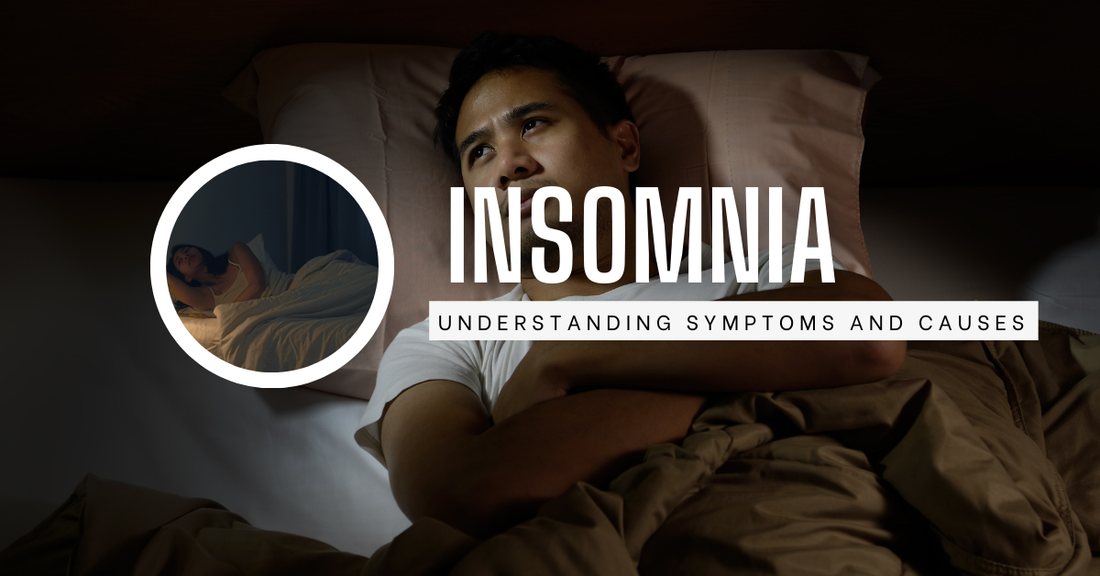
Insomnia: Understanding Symptoms and Causes
Share
Insomnia, a common sleep disorder, affects millions of people worldwide. It's characterized by difficulty falling asleep, staying asleep, or both, leading to daytime fatigue and other problems. While occasional sleeplessness is normal, persistent insomnia symptoms and causes can significantly impact your quality of life.
This blog delves deeper into the various aspects of insomnia, including its early signs, common symptoms, underlying causes, and potential side effects.
Table of Contents
Insomnia Early Signs: Recognizing the Red Flags
Before full-blown insomnia symptoms manifest, there are often subtle early signs to watch out for:
- Difficulty falling asleep: It may take you longer than usual to fall asleep, or you may wake up frequently during the night.
- Restless sleep: You may feel like you haven't slept soundly, even if you've been in bed for several hours.
- Waking up too early: You may find yourself waking up much earlier than usual and struggling to fall back asleep.
- Daytime fatigue: You may feel tired, sluggish, and have difficulty concentrating throughout the day.
- Increased irritability: You may experience increased irritability, mood swings, and difficulty controlling your emotions.
If you experience these early signs consistently for a few weeks, it's important to consult a healthcare professional to rule out any underlying medical conditions and discuss potential treatment options.

Insomnia Symptoms: Understanding the Impact
Insomnia symptoms can vary in severity and duration. Some of the most common ones include:
- Difficulty falling asleep: Taking more than 30 minutes to fall asleep at night.
- Frequent nighttime awakenings: Waking up several times during the night and having difficulty falling back asleep.
- Early morning awakening: Waking up much earlier than usual and being unable to fall back asleep.
- Non-restorative sleep: Feeling tired and unrefreshed even after a full night's sleep.
- Daytime fatigue: Feeling sleepy, sluggish, and lacking energy throughout the day.
- Difficulty concentrating: Having trouble focusing on tasks, remembering things, and making decisions.
- Increased irritability: Experiencing more frequent mood swings, anxiety, and frustration.
- Muscle tension: Feeling tense and tight in your muscles, especially in the neck and shoulders.
- Headaches: Experiencing frequent headaches, including tension headaches.
- Stomach problems: Having digestive issues like indigestion or heartburn.
These insomnia symptoms can significantly impact your daily life, affecting your work, relationships, and overall well-being.
Insomnia Causes: Identifying the Triggers
Insomnia causes can be categorized as primary or secondary:
Primary insomnia:
This type of insomnia has no underlying medical condition and is often caused by:
- Stress: Major life events, work-related stress, or ongoing personal worries can disrupt sleep patterns.
- Poor sleep habits: Irregular sleep schedules, napping excessively during the day, and using electronic devices before bed can contribute to insomnia.
- Environmental factors: An uncomfortable sleep environment, such as excessive noise, light, or temperature fluctuations, can interfere with sleep.
- Behavioural factors: Consuming caffeine or alcohol close to bedtime, smoking, and lack of regular exercise can negatively impact sleep quality.
Secondary insomnia:
This type of insomnia is caused by an underlying medical condition, such as:
-
Mental health conditions: Anxiety, depression, and post-traumatic stress disorder (PTSD) can disrupt sleep patterns.
-
Chronic pain: Painful conditions like arthritis, back pain, and migraines can make it difficult to sleep comfortably.
-
Neurological disorders: Parkinson's disease, Alzheimer's disease, and restless legs syndrome can affect sleep quality.
-
Medications: Certain medications, including some antidepressants, stimulants, and allergy medications, can interfere with sleep.
-
Other medical conditions: Sleep apnea, acid reflux, and hyperthyroidism can also contribute to insomnia.
It's important to consult a healthcare professional to determine the underlying cause of your insomnia symptoms and discuss appropriate treatment options.
Insomnia Side Effects: Understanding the Consequences
Chronic insomnia symptoms and causes can lead to various side effects, impacting your physical and mental health:
- Increased risk of accidents and injuries: Daytime fatigue and impaired cognitive function can increase the risk of accidents while driving or operating machinery.
- Weakened immune system: Lack of sleep can make you more susceptible to infections and other illnesses.
- Exacerbated mental health conditions: Insomnia can worsen symptoms of anxiety and depression, creating a vicious cycle.
- Cardiovascular problems: Chronic insomnia has been linked to an increased risk of heart disease, high blood pressure, and stroke.
- Weight gain: Disrupted sleep can affect hormones that regulate appetite, potentially leading to weight gain.
- Decreased quality of life: The overall impact of insomnia on daily functioning and well-being can be significant.
If you're experiencing insomnia symptoms and causes, seeking professional help is crucial. Early diagnosis and treatment can help manage the condition and improve your sleep quality, leading to a healthier and more fulfilling life.
Seeking Help for Insomnia
If you suspect you have insomnia, it's important to consult a doctor or sleep specialist. They can help you diagnose the underlying cause and develop a personalized treatment plan. Treatment options may include:
- Cognitive behavioural therapy for insomnia (CBT-I): This therapy focuses on identifying and changing negative thoughts and behaviours that contribute to insomnia.
- Relaxation techniques: Techniques like deep breathing, meditation, and progressive muscle relaxation can help you calm your mind and prepare for sleep.
- Sleep hygiene improvements: Establishing a regular sleep schedule, creating a relaxing bedtime routine, and optimizing your sleep environment can significantly improve sleep quality.
- Medications: In some cases, medication may be prescribed to help you fall asleep or stay asleep. However, medication should only be used under the guidance of a doctor and as part of a comprehensive treatment plan.
Conclusion
Insomnia can be a frustrating and disruptive sleep disorder, but it's important to remember that you're not alone. By understanding the symptoms and causes of insomnia, you can take steps to improve your sleep quality and overall well-being.
If you are struggling with sleep problems, don't hesitate to seek professional help. A doctor or sleep specialist can help you diagnose the underlying cause of your insomnia and develop a personalized treatment plan. Remember, prioritizing your sleep is an investment in your health and happiness.
Frequently Asked Questions (FAQs)
1. What is the difference between acute and chronic insomnia?
Acute insomnia is a short-term sleep disturbance that typically lasts for a few days or weeks. It is often caused by stress, life events, or changes in sleep schedule. Chronic insomnia is a long-term condition that lasts for at least three months and can significantly impact your daily life.
2. Can diet affect insomnia?
Yes, certain foods and drinks can disrupt your sleep. Caffeine, alcohol, and sugary foods can all interfere with sleep quality. It's best to avoid these substances, especially in the evening hours.
3. Can exercise help with insomnia?
Regular exercise can improve sleep quality. However, avoid strenuous exercise close to bedtime, as it can be stimulating.
4. Are there any natural remedies for insomnia?
Relaxation techniques like deep breathing, meditation, and progressive muscle relaxation can help you fall asleep and stay asleep. Additionally, establishing a regular sleep schedule and creating a relaxing bedtime routine can significantly improve sleep quality.
